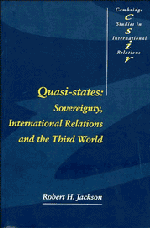Book contents
- Frontmatter
- Contents
- Acknowledgements
- INTRODUCTION
- 1 STATES AND QUASI-STATES
- 2 A NEW SOVEREIGNTY REGIME
- 3 SOVEREIGNTY REGIMES IN HISTORY
- 4 INDEPENDENCE BY RIGHT
- 5 SOVEREIGNTY AND DEVELOPMENT
- 6 SOVEREIGN RIGHTS VERSUS HUMAN RIGHTS
- 7 QUASI-STATES AND INTERNATIONAL THEORY
- CONCLUSION
- Notes
- Index
- CAMBRIDGE STUDIES IN INTERNATIONAL RELATIONS
2 - A NEW SOVEREIGNTY REGIME
Published online by Cambridge University Press: 01 June 2011
- Frontmatter
- Contents
- Acknowledgements
- INTRODUCTION
- 1 STATES AND QUASI-STATES
- 2 A NEW SOVEREIGNTY REGIME
- 3 SOVEREIGNTY REGIMES IN HISTORY
- 4 INDEPENDENCE BY RIGHT
- 5 SOVEREIGNTY AND DEVELOPMENT
- 6 SOVEREIGN RIGHTS VERSUS HUMAN RIGHTS
- 7 QUASI-STATES AND INTERNATIONAL THEORY
- CONCLUSION
- Notes
- Index
- CAMBRIDGE STUDIES IN INTERNATIONAL RELATIONS
Summary
SOVEREIGN STATEHOOD
Sovereignty in international relations signifies constitutional independence of other states. In the words of Alan James, ‘all that constitutional independence means is that a state's constitution is not part of a larger constitutional arrangement’. The Gold Coast, a British colony, was not sovereign because it was not legally independent of Great Britain. Indeed, it was constitutionally part of the British Empire. Ghana, the sovereign successor to the Gold Coast since 1957, is legally independent not only of Britain but of all other sovereign states.
Sovereignty, according to James, ‘is a legal, absolute, and unitary condition’. Legal in that a sovereign state is not subordinate to another sovereign but is necessarily equal to it by international law – although, of course, not necessarily by international fact. Absolute in that sovereignty is either present or absent. When a country is sovereign it is independent categorically: there is no intermediate condition. In international law such statuses as ‘trusteeship’ and ‘associate statehood’ have been conceived and even recognized. They do not signify semisovereignty, however. They are different legal categories altogether. ‘In this matter, there can, in principle, be no half-way house, no question of relative sovereignty’. Unitary in that a sovereign state is a supreme authority within its jurisdiction. This is the case whether or not a state has a unitary or a federal constitution, because in either case it is a sole authority in its external relations with other states.
- Type
- Chapter
- Information
- Quasi-StatesSovereignty, International Relations and the Third World, pp. 32 - 49Publisher: Cambridge University PressPrint publication year: 1991



